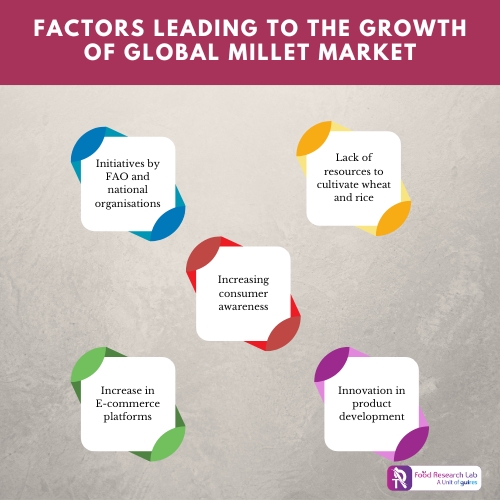
What factors contribute to the growth of the millet market globally
Introduction
Millets refer to a diverse group of small-grained cereals and were among the world’s oldest cultivated crops. They are primarily grown in Asian and African countries, with India being the largest producer, followed by Nigeria, Niger, and China. They are a traditional crop in parts of Asia and Sub-Saharan Africa. They are highly resilient and can withstand harsh environmental conditions. Millets can be grouped as major millets, which include Sorghum (jowar, which consists of white jowar and red jowar) and pearl millet (bajra), minor millets, which include finger millet (ragi millet) and small millets (Barnyard millet, Kodo millet, Foxtail millet, Little millet and Proso millet).
Factors driving the growth of the millet market
The global market for millets was valued at 9.95 billion US dollars and is expected to reach 14.14 billion US dollars by 2028 at a rate of 4.49% Compound Annual Growth Rate (CAGR). The factors that contribute to the growth are as follows:

1.Initiatives by national and international organisations
The United Nations has declared 2023 the International Year of Millets. The governments of many countries are also observing the International Year of Millets 2023 , along with the Food and Agricultural Organization (FAO), wherein awareness would be created and increase the production and consumption of millets.
2.Lack of resources to cultivate wheat and rice
The cultivation of wheat and rice is resource intensive and depends on the availability of labour, capital, energy and water. These are not available in abundance in South Asian countries. The lack of underground water, soil fertility, land availability and frequent storms further aggravate the issue. Millets can grow under extreme conditions and can compensate for the lack of production of wheat and rice.
3.Rising health awareness
Consumers are gaining awareness regarding the health benefits of millet, which is rich in resistant starch, B vitamins, iron and calcium. In addition, millets contain antioxidants, which are implicated in preventing and managing lifestyle-related disorders like obesity, diabetes and hypertension .
An increasing number of individuals suffer from gluten sensitivity, which causes coeliac disease. Millets are the best option for such people since they are gluten free. Millets can be consumed as cereals, bread, and pancakes.
4.The rise of E-Commerce
With an increase in the number of smartphone users, the avenues for e-commerce have been opened, and many industries can place their products with discounts that attract consumers. The food industries developing millet food products can also offer incentives for consumers, which acts as a factor for growth [1].
5.Innovations in Food product development
The food industry has become aware of the consumers’ inclination towards natural and organic products, and there have been studies on using millet as an ingredient to formulate various innovative millet based food products like millet based noodles, baked products, snacks, granola and muesli.
Conclusion
The global millet market has experienced significant growth, fuelled by factors like initiatives by national and international organisations, sustainability, increasing consumer awareness, the rise of e-commerce platforms and the development of innovative millet based products where millets can be consumed in forms other than hot cereals.
How the Food Research Lab can help
We have a team of experts who help develop food, beverage, nutraceutical and cosmeceutical products. We begin the process after conducting market and consumer research, which helps our clients make informed decisions regarding product development. Our expert team has assisted in formulating nutritious and delectable products using millets like millet laddoo and ready to cook products that can be prepared quickly. In addition, we also assist with food industry certifications and provide labelling services, ensuring the product formulated meets the regulatory specifications, guaranteeing its success.





